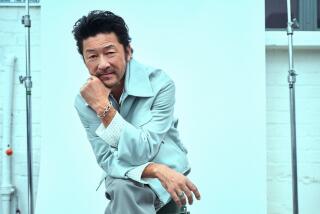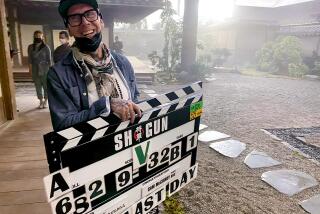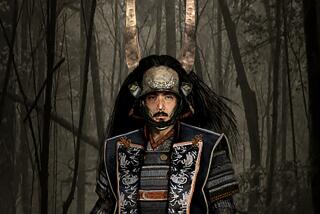Strong samurai, soft heart
For Westerners unschooled in the way of the movie samurai, the classic image of the loyal retainer doubtless looks something like Obi-Wan Kenobi -- or the late John Belushi. A genial riff on the great Toshiro Mifune, star of such Akira Kurosawa masterpieces as âSeven Samurai,â Belushiâs satiric samurai perfectly distilled the image of the warrior as lethal enigma -- a powder keg with a topknot and very short fuse. In the years since, the archetype has been tweaked and twisted but seldom to such pleasantly moving effect as in Yoji Yamadaâs âThe Twilight Samurai.â
Based on three Shuhei Fujisawa stories, the film principally takes place in the turbulent years leading to the Meiji Restoration, when Japan opened its doors to the West. After losing his wife, Iguchi Seibei (touchingly played by Hiroyuki Sanada, a star of the cult âRingâ movies) struggles to raise his young daughters and care for his ailing mother. A low-level samurai, he keeps track of his masterâs stores of foodstuffs alongside half a dozen other worker-bee warriors. Most of Seibeiâs waking hours are spent tabulating figures while seated behind a desk; when quizzed by a superior, he knows exactly how many yearsâ worth of salted cod are stashed on the shelves. Essentially a âsalarymanâ with a sword, he couldnât seem further removed from the warrior ideal.
Much of the slow-building pleasure of âThe Twilight Samuraiâ comes from discovering just how far from that ideal Seibei actually is. One evening, after coming to the defense of a friend, the samurai finds himself forced to fight a duel with a higher-ranking warrior. Forbidden to fight by his clan, Seibei devises a fiendishly clever strategy -- instead of a sword, heâll wield a cudgel. A model of precision choreography and contrapuntal pacing (each samurai moves to a different beat), the fight comes to its swift, pointedly anti-climatic conclusion not long after it begins. The first real fight in the film, it erupts almost an hour into the story and only after a fair amount of gentle buildup, much of it involving the samuraiâs tenderly doting relationship with his daughters.
As with any number of Japanese films, âThe Twilight Samuraiâ concerns an individual caught between tradition and radical change. A vanishing breed, the samurais faced redundancy once Japan traded its warrior class for an imperial army. For Seibei, the transition from one way of life to another began with his wifeâs death, a turning point that led him to transfer his loyalty from his master to his two children. The struggle between these competing loyalties, a struggle that still plays out in larger Japanese society, reaches a climax once the samurai is ordered to fulfill one last violent obligation to his lord. How Yamada -- best known for his dozens (yes, dozens) of âTora-sanâ features -- brings the samuraiâs crisis to a close emerges with the filmâs second, and final, superbly executed fight.
A commercial success in Japan on its release in 2002, âThe Twilight Samuraiâ was nominated for an Academy Award for Best Foreign Language Film this year, making it the first live-action Japanese feature to be nominated in more than two decades. Although these nominations generally attest to the willfully pedestrian taste of the academyâs nominators -- âThe Twilight Samuraiâ is far from an aesthetic triumph, much less the best non-animated Japanese feature in 20 years -- the film creeps into your affections with admirable stealth. Much of its success rests with Sanada, who carries a world of heartbreak on his stoically squared shoulders. But the filmâs septuagenarian director deserves his share of the credit for bringing this human story to the screen with engaging B-movie modesty and no small measure of chops.
*
âThe Twilight Samuraiâ
MPAA rating: Unrated
Times guidelines: Swordfighting, some blood, dead bodies
Hiroyuki Sanada...Seibei Iguchi
Rie Miyazawa...Tomoe
Nenji Kobayashi...Hisasaka Choubei
Min Tanaka...Yoho Zenemon
Tetsuro Tamba...Tozaemon Iguchi
Released by Empire Pictures. Director Yoji Yamada. Writers Yoshitaka Asama, Yoji Yamada. Based on novellas by Shuhei Fujisawa. Producers Hiroshi Fukazawa, Shigehiro Nakagawa, Ichiro Yamamoto. Costumes Kazuko Kurosawa. Director of photography Matsuo Naganuma. Set designer Mitsuo Degawa. Editor Iwao Ishii. Sound Kazumi Kishida. Music Isao Tomita, Yousui Inoue. Running time: 2 hours, 9 minutes. In Japanese with English subtitles.
Exclusively at Landmarkâs Westside Pavilion Cinemas, Westside Pavilion, 10800 W. Pico Blvd., (310) 475-0202, and Laemmleâs Pasadena Playhouse, 673 E. Colorado Blvd., Pasadena, (626) 844-6500.
More to Read
Only good movies
Get the Indie Focus newsletter, Mark Olsen's weekly guide to the world of cinema.
You may occasionally receive promotional content from the Los Angeles Times.










